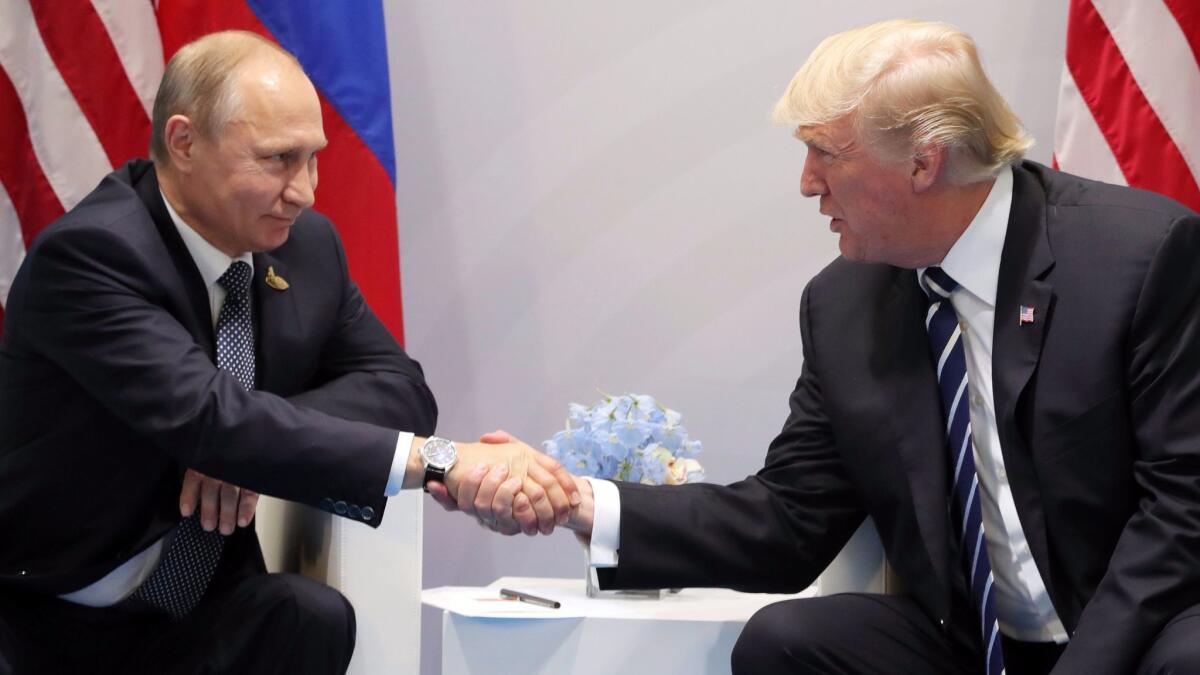Editorial: Just because Trump has a blind spot on Russia doesn’t mean the rest of the government has to

- Share via
Despite claims by some officials in his administration that President Trump aggressively confronted Russian President Vladimir Putin about Russian interference in last year’s American elections, it’s abundantly evident that he continues to have what Sen. Lindsey Graham calls a “blind spot” about the subject.
It’s equally obvious why that is so: Trump continues to see any acknowledgment of Russian meddling as undermining the legitimacy of his election victory. (The same insecurity underlies the creation of his administration’s ill-conceived commission to investigate supposed voter fraud.)
After the president’s meeting with Putin in Hamburg, Germany, on Friday, Secretary of State Rex Tillerson, who was also present, told reporters that Trump began the discussion by “raising the concerns of the American people regarding Russian interference.” Nikki Haley, the U.S. representative to the United Nations, who wasn’t at the meeting, went further, claiming that Trump told Putin: “We know you did it, and cut it out.”
Trump’s perverse reluctance to acknowledge Russia’s role in seeking to disrupt the U.S. election justifies a greater role for Congress.
But Putin and his foreign minister, Sergei Lavrov, suggested that Trump accepted Putin’s denial that Russia had interfered. Trump himself, in what has become the most authoritative means of communication for him, tweeted: “I strongly pressed President Putin twice about Russian meddling in our election. He vehemently denied it. I’ve already given my opinion.”
And what is that opinion? On Thursday, the day before the meeting, Trump told reporters in Warsaw that “I think it could very well have been Russia” but that “it could well have been other countries.”
So the blind spot remains. Trump is likely to become even more defensive on the subject now that it has been revealed that his son Donald Trump Jr. met last year with Natalia Veselnitskaya, a Russian lawyer with ties to the Kremlin. The meeting, which also involved Trump’s son-in-law Jared Kushner and his former campaign chairman Paul Manafort, was arranged after the younger Trump was told it would produce information damaging to Hillary Clinton. (On Tuesday Veselnitskaya denied that she offered to share such information.)
Fortunately, others in the administration — and members of Congress — are taking steps to control the damage to U.S. foreign policy caused by Trump’s ego-driven reluctance to acknowledge Russian interference in the election.
Take, for example, his naive announcement after the meeting with Putin that the U.S. and Russia had discussed joining together in what Trump called “an impenetrable Cyber Security unit so that election hacking, & many other negative things, will be guarded.”
After the idea was savaged by fellow Republicans — including Graham, who said it was “not the dumbest idea I’ve ever heard, but it’s pretty close” — Trump abruptly reversed course. “The fact that President Putin and I discussed a Cyber Security unit doesn’t mean I think it can happen,” he tweeted Sunday evening.
The president occasionally has been willing to criticize Russian behavior outside the context of the election. In his speech in Warsaw last week, he urged Russia to “cease its destabilizing activities in Ukraine and elsewhere, and its support for hostile regimes — including Syria and Iran.” He suggested on Twitter that sanctions would not be lifted until “the Ukranian & Syrian problems are solved!” In Ukraine over the weekend, Tillerson made it clear that sanctions would remain in place until Moscow reined in pro-Russian separatists and removed weapons from eastern Ukraine.
Regardless of what the administration may say, members of both parties in Congress seem determined to make it difficult for the president to lift sanctions imposed on Russia not only for its annexation of Crimea and its support for separatists in Ukraine but also for meddling in the election. To punish Russia for the latter, former President Barack Obama ordered the expulsion of 35 Russian diplomats and closed two rural estates in Maryland and New York allegedly used by Russian spies.
Last month the Senate by a 98-2 vote approved legislation that would allow Congress to block a decision by the president to lift sanctions imposed on Russia; the House should follow suit. Ordinarily the president is entitled to considerable discretion in the management of foreign affairs, which is why sanctions legislation typically includes provisions for a presidential waiver. But Trump’s perverse reluctance to acknowledge Russia’s role in seeking to disrupt the U.S. election justifies a greater role for Congress. With a less self-obsessed and insecure president such vigilance wouldn’t be necessary.
Follow the Opinion section on Twitter @latimesopinion and Facebook
ALSO
Trump Jr. posts emails that promised information about Clinton
The Russian lawyer who met with Donald Trump Jr. was unknown in the U.S. -- until now
UPDATES:
7:40 a.m.: This post was updated to include Veselnitskaya’s denial.
More to Read
A cure for the common opinion
Get thought-provoking perspectives with our weekly newsletter.
You may occasionally receive promotional content from the Los Angeles Times.









